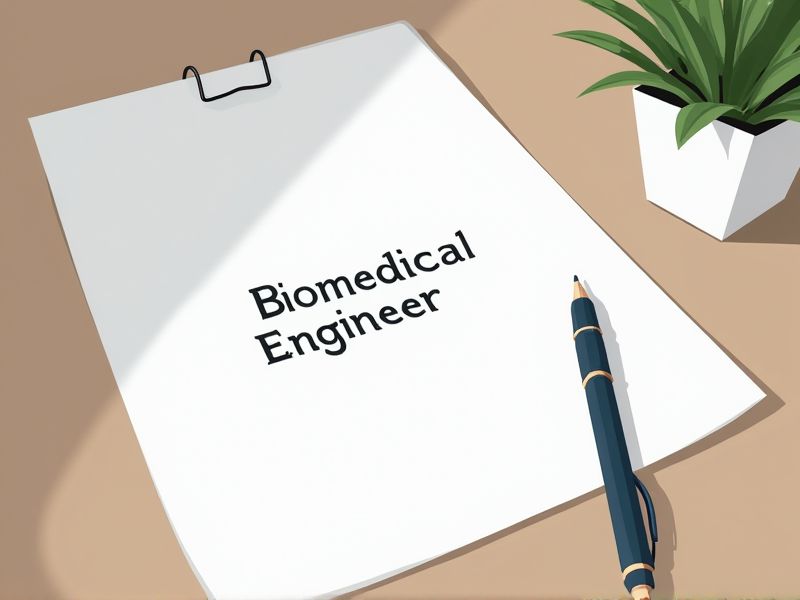
Biomedical engineers operate at the intersection of healthcare and technology, necessitating a robust understanding of medical devices and systems regulations. Certifications can validate a professional's competence in adhering to industry standards and advancements. They enhance credibility and open opportunities for specialized roles. Important certifications for a biomedical engineer are detailed below.
Certified Biomedical Equipment Technician (CBET)
Certified Biomedical Equipment Technicians (CBET) enhance the safety and functionality of medical equipment, directly impacting patient care efficiency. Their expertise in troubleshooting and maintaining sophisticated devices reduces downtime, significantly lowering repair costs. Certification ensures compliance with healthcare regulations, which fosters trust in the equipment's performance and reliability. Collaborative efforts with biomedical engineers optimize the design and implementation of cutting-edge medical technologies.
Certified Clinical Engineer (CCE)
Certified Clinical Engineers (CCE) ensure that biomedical equipment operates safely and efficiently, reducing the risk of patient harm. CCEs bring a validated level of expertise, which supports hospitals in maintaining compliance with regulatory standards. Effective integration and management of biomedical technology in clinical settings often hinge on the specialized knowledge CCEs provide. Their certification acts as a benchmark, fostering trust and collaboration among multidisciplinary healthcare teams.
Project Management Professional (PMP)
PMP certification equips biomedical engineers with essential project management skills, enhancing their ability to lead complex development projects efficiently. Effective project management ensures timely completion and adherence to regulatory standards, crucial in the biomedical field where precision and compliance are critical. Biomedical engineers often work on interdisciplinary teams; PMP certification fosters improved communication and coordination among specialists. The credential can also boost career progression, providing engineers with a competitive edge in an industry where innovation and project success are key drivers.
Regulatory Affairs Certification (RAC)
Regulatory Affairs Certification (RAC) is essential for biomedical engineers because it equips them with specialized knowledge in navigating complex regulatory environments, ensuring that medical devices comply with regional and international standards. Gaining RAC enhances a biomedical engineer's credibility and marketability, as they can effectively contribute to product approval processes. The certification deepens understanding of regulatory documentation and processes, minimizing the risk of non-compliance, which can lead to costly delays and penalties. With RAC, biomedical engineers can better collaborate with cross-functional teams, improving communication between engineering and regulatory departments.
Six Sigma Green Belt Certification
Achieving a Six Sigma Green Belt Certification enhances a biomedical engineer's process improvement skills, leading to reduced defects and improved quality in medical devices. With this certification, engineers are better equipped to analyze data, resulting in more efficient and cost-effective project management. It fosters a deep understanding of quality control methodologies, ensuring product safety and compliance with industry regulations. The certification also increases career advancement opportunities by demonstrating a commitment to excellence and continuous improvement.
Certified Quality Engineer (CQE)
The involvement of a Certified Quality Engineer (CQE) in biomedical engineering ensures that product development processes adhere to industry standards and regulations, which minimizes the risk of non-compliance. Incorporating a CQE results in improved quality control measures, enhancing patient safety and the reliability of biomedical devices. Cost efficiency emerges as a byproduct when CQEs streamline processes, reducing waste and preventing errors during production. The presence of CQEs fosters a culture of continuous improvement, promoting innovation while maintaining the stringent quality requirements of the biomedical field.
ISO 13485 Lead Auditor Certification
ISO 13485 Lead Auditor Certification ensures a biomedical engineer comprehends regulatory standards critical for medical device quality management systems. This certification signals an engineer's ability to conduct effective audits, essential for maintaining compliance and improving product safety. By possessing such expertise, engineers can help organizations avoid costly non-compliance penalties and facilitate smoother market entry. With the industry demand for high-quality medical devices, certified individuals become valuable assets in ensuring consistency and reliability in product development.
Certified Professional in Healthcare Information and Management Systems (CPHIMS)
The increasing complexity of healthcare information systems necessitates that biomedical engineers possess specialized knowledge, making CPHIMS certification essential. This certification equips biomedical engineers with the skills to effectively manage and integrate technology within healthcare environments. As healthcare technology continues to advance, CPHIMS ensures that engineers are proficient in industry standards and regulatory requirements. Employers often seek certified professionals to ensure expertise in system interoperability, data management, and enhancing patient outcomes.
Medical Device Development Certification
Medical Device Development Certification enhances a biomedical engineer's understanding of regulatory standards, which is crucial for ensuring device compliance and patient safety. This certification often increases a professional's competency in navigating the complex landscape of medical device lifecycle management. It typically provides engineers with a competitive edge in the job market, as employers prefer candidates with specialized knowledge. Certification can lead to improved innovation and efficiency in the development of cutting-edge medical technologies.
Lean Healthcare Certification
Lean Healthcare Certification equips biomedical engineers with skills to streamline processes in healthcare facilities. This leads to reduced waste and increased efficiency in medical equipment usage. Engineers gain the ability to optimize healthcare delivery, improving patient outcomes. Hospitals can experience enhanced cost-effectiveness and resource management as a result.
Summary
When you, as a Biomedical Engineer, obtain certifications, you enhance your professional credibility and marketability. This leads to a greater likelihood of securing advanced job roles and potentially higher salaries. As recognized expertise increases, employers may show a stronger interest in your profile due to validated skills. Your capability to design, analyze, and improve healthcare technologies becomes more effective and reliable.
